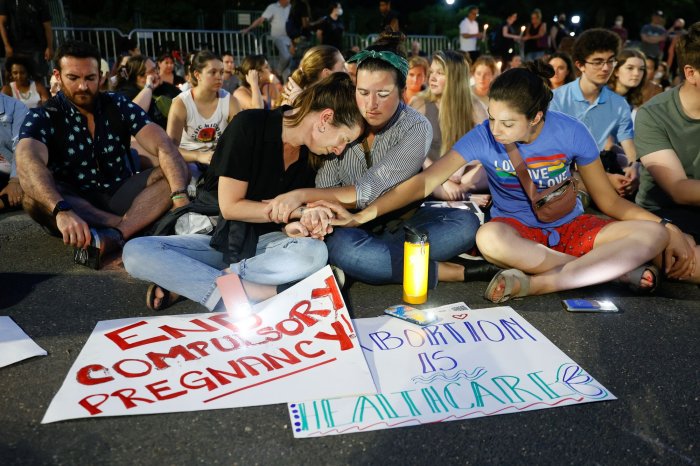Women attend a candlelight vigil in Washington on June 26, two days after the U.S. Supreme Court overturned Roe vs. Wade, ending federal abortion protections. Photo by Jemal Countess/UPI |
License Photo
July 12 (UPI) -- A federal judge in Arizona has temporarily blocked a state law that grants so-called personhood rights to fetuses, embryos and fertilized eggs, stating it is unconstitutionally vague.
U.S. District Court Judge Douglas Rayes ruled Monday against the state's Interpretation Policy on the grounds that it is "intolerably vague," preventing healthcare professionals from knowing if they are breaking state law by providing abortion care.
Arizona enacted the Interpretation Policy in April of last year, which directs the state to interpret and construe all state laws to "acknowledge" that an unborn child, at all stages of development, has the same rights and privileges as any other resident.
That August, the Center for Reproductive Rights filed a challenge against the Interpretation Policy but then filed an emergency motion asking the court for injunctive relief after the Supreme Court last month overturned Roe vs. Wade.
The abortion providers argued that after the federal protections for abortion were revoked by the high court, they stopped performing legal abortion services as they had no way to know if they could be punished for doing their jobs under the Interpretation Policy.
In his ruling Monday, Rayes wrote that it was unclear exactly what the Interpretation Policy does, stating it "either does absolutely nothing or it does something."
"What that something might be is a mystery or, as defendants put it, 'anyone's guess,'" he wrote.
Rayes continued that the state seems to believe that the policy does little to nothing and that enjoining it would be "purely symbolic."
Though that might be the case, the state still needs to explain the effects of the law as healthcare providers "should not have to operate under a shadow of uncertainty, especially when defendants have been unable to provide a coherent and satisfactory explanation of what the Interpretation Policy does," he said.
Rayes added his injunction will not harm Arizona, but if it wants to extend legal protections to the unborn, it can through amending the definition of "person" in other state statutes.
"What Arizona cannot do is enact a vague rule of statutory construction that sows confusion through its laws, leaving people to guess what their conduct will reap," he said.
Jessica Sklarsky, senior staff attorney at the Center for Reproductive Rights, said in a statement that the court was right to block the law but more needs to be done in the state and nationwide to protect access to the medical procedure.
"The Supreme Court's catastrophic decision overturning Roe vs. Wade has unleashed chaos on the ground, leaving Arizona residents scrambling to figure out if they can get the abortion care they need," Sklarsky said. "People should not have to live in a state of fear when accessing or providing essential healthcare.
"We will continue our fight to preserve abortion access in Arizona and across the country."
According to state data, there were 13,273 abortions performed in Arizona in 2020.
The ruling comes as several Republican-led states have sought to enact abortion bans in the wake of Roe vs. Wade being overturned. Many of these laws have been confronted with litigation.















